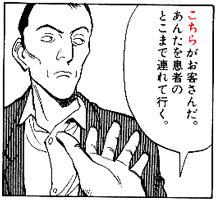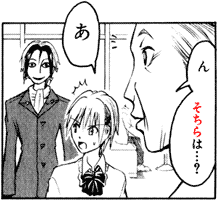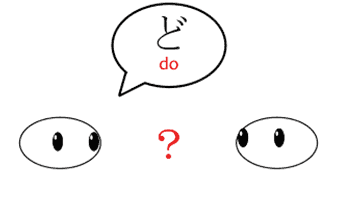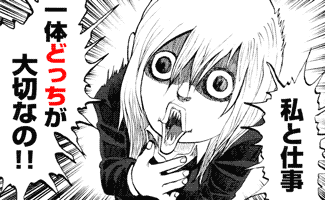In Japanese, kochira, sochira, achira, dochira こちら, そちら, あちら, どちら mean "this way (toward me)," "that way (toward you)," "that way (away from us)," and "what way?" respectively. They're kosoado words related to direction, but they can also refer to sides, choices, and people.
The words kocchi, socchi, acchi, docchi こっち, そっち, あっち, どっち are abbreviations of kochira, sochira, achira, dochira. They're used the same way in some cases, but they aren't considered as polite.
Directional Pronouns
The literal meaning of kochira, sochira, achira and dochira refers to directions.
- kochira
こちら
This direction, toward me.
This way, toward here.
This side, my side. - sochira
そちら
That direction, toward you.
That way, near you.
That side, your side. - achira
あちら
That direction, away from us.
That way, not near us. - dochira
どちら
What direction?
What way?
What side?
Some examples of how they're used:
- kochira ni mukatte kuru!
こちらに向かってくる!
To this way, facing and coming!- This phrase is used when someone, or an animal, monster, etc. is heading toward you.
- The verb mukau 向かう means they're "facing" toward you, while kuru 来る means they're "coming" kochira, "this way."
- achira wa watashi no tomodachi desu
あちらは私の友達です
That way are my friends.- My friends are over there.
kochira e こちらへ
The phrase kochira e こちらへ means literally "toward here." It's used when telling people where to go, like when you point toward a door, or entrance, and say kochira e, you should go in there.
The phrase is a bit tricky to understand for two reasons.
First, this e へ is the e へ particle that marks a direction. It's tricky because normally that hiragana is read as he へ, but when it's the particle it's read as e え instead.
Second, the phrase is missing a verb. This actually happens in Japanese more than you would expect. Generally, when it happens, the verb is "to come" or "to go." For example:
- kochira e kite
こちらへ来て
Come toward here.
You may also see it as:
- kochira e douzo
こちらへどうぞ
Toward here, [if you may]. - kochira desu
こちらです
It's this direction.
It's [toward] here. - achira desu
あちらです
It's that direction.
It's [toward] there. Not to my direction, not to your direction. To somewhere else.
dochira e? どちらへ?
The same thing happens with dochira e どちらへ.
- dochira e?
どちらへ?
Toward where? - dochira e ikimasu ka?
どちらへ行きますか?
Toward where are [you] going?
kochira vs. koko
The difference between kochira and koko is that the kochira, sochira, achira, dochira refer to vague directions, while koko, soko, asoko, doko ここ, そこ, あそこ, どこ refer to exact places.
In other words, sochira means "there" in the sense of toward there, while soko means "there" in the sense of that exact spot there. This can be better observed in the following examples:
- kochira e kite
こちらへ来て
Come toward here.
Come toward this direction.- Toward where I'm showing you.
- Maybe I'm pointing at this door, for example, and you're supposed to go through there.
- koko e kite
ここへ来て
Come toward here.
Come toward this place.- Toward where I am. This place around me.
- To my house, maybe. I don't know, if I'm at work, to my workplace.
- Maybe you're from another country, so to here, to my country.
- Or you're an alien, so to here, to this planet that is here.
When speaking politely, the word dochira is sometimes preferred over doko.
- kyou wa doko e iku?
今日はどこへ行く?
Where [you] going today? - kyou wa dochira e ikaremasu ka?
今日はどちらへ行かれますか?
Where would [you like] to go today?- iku
行く
To go. - ikareru
行かれる
To go. - In polite speech, sometimes verbs are conjugated to their passive forms without making the voice passive. So you have an active voice even with a passive verb.
- It's weird like that.
- iku
Personal Pronouns
From the literal directional pronoun meaning of kochira, sochira, achira, dochira, comes a second, but very common, usage: to refer to people. Making these words also personal pronouns.
- kochira
こちら
This person.
I. Me. Us.
He. She. - sochira
そちら
That person. (near you.)
You.
He. She. - achira
あちら
That person. (away from us.)
He. She. - dochira
どちら
What person?
Who?
The pronouns konata, sonata, anata, donata こなた, そなた, あなた, どなた also kind of behave this way: they first referred to directions, and then to people in toward those directions.
- kochira ga okyakusan da.
こちらがお客さんだ。
Toward here is the customer.
This here is the customer.
This person here is the customer.
This person is the customer.
He is the customer. - anta wo kanja no toko made tsurete-iku.
あんたを患者のとこまで連れて行く。
[He will] bring you until the patient's location.- He'll bring you to where the patient is.
- toko とこ
tokoro ところ
Location. Place. Spot.
My Side, Your Side
You may have noticed that kochira こちら can also mean "I" besides "this person." And that sochira そちら can also meann "you" besides "that person."
This works just like when we say, in English, "this side of the deal." The side toward our direction. Then, we're talking about "our side of the deal." Conversely, "that side," is "their side."
Normally, you don't use kochira, sochira, achira as personal pronouns like you would use words such as watashi 私, anata あなた, and kare 彼.
You use kochira, sochira, achira when you need contrast. There's them, their side, their party, and they're somehow. And there's you, your side, your party, and you're somehow else.
- kochira mo ganbaranai to
こちらも頑張らないと
If my side, too, doesn't put effort.- ...then that's no good. Thus:
- My side, too, should put effort.
- I, too, should put effort.
- They're working so hard, if I don't work hard, too, it won't feel right.
The word aite 相手 sometimes appears together with kochira. It's kind of hard to translate, but it basically means the opposing party of an action. The person with whom you're doing something, or with whom you're talking to.
The difference between aite and sochira is that sochira is the listener, the person with whom you're talking to at the moment, while aite isn't necessarily the listener, it's just the "other" of an action.
In some cases, kochira can mean "I" or "we," or even "you," in the sense of what "our side" decides to do. To elaborate:
- kochira ga aite wo foroo suru
こちらが相手をフォローする
This side follows the "aite." (on Twitter, etc.)- The "aite" is whom we are following.
- I follow him. I follow her. I follow them.
- Like, let's say that we follow them on Twitter... then what happens?
- I mean, they don't follow you on twitter, but what if...
- You follow them on twitter? Wouldn't that be great?
The words kochira and sochira are particularly used when talking to people over telephone, e-mail, etc. Because then both meanings apply: sochira can mean you, over the phone, or it can mean toward there, where you are.
- kochira wa genki desu,
sochira wa dou desu ka?
こちらは元気です
そちらはどうですか?
My side is fine,
Your side is how?- I'm fine, how are you?
- kochira wa samui desu,
sochira wa samui desu ka?
こちらは寒いです
そちらは寒いですか?
Toward here is cold,
Toward there is cold?- On this side of the call, where I am, is cold,
is over there, on the other side, cold?
- On this side of the call, where I am, is cold,
- kochira wa atsui desu,
sochira wa atsui desu ka?
こちらは暑いです
そちらは暑いですか?
Here where I am is hot,
is it hot there where you are?
This same principle also applies to some other words in Japanese.
For example, the word hou 方 means "direction," "way," while kata 方, a different word written with the same kanji, means "person" instead.
Sometimes you may find the phrase kono kata この方, "this person," which works just like kochira こちら, including the fact it can refer to the speaker himself, that is, "this person" can can mean "I," "me."
- umarete kono kata
maketa koto ga nai
生まれてこの方
負けたことがない
Born, this person
has lost not.- [From the time] I was born [until now], [I've] never lost [a fight].
- koto ga nai ことがない
After verb: never done that.
kochira koso
The phrase kochira koso こちらこそ means "no, it's I who should be saying it," or maybe doing it. This koso こそ is a bit tricky to explain, but anyway, it's often used when the speaker is thanked or complimented somehow, and he thinks he is the party that should be expressing gratitude instead.
- arigatou
ありがとう
[Thank you]. - iya iya, kochira koso
いやいや、こちらこそ
No, no, it's I who should say that.
No, no, it's I who is thankful for that.
- kochira koso arigatou gozaimasu
こちらこそありがとうございます
It's I who's thankful for that. - kochira koso yoroshiku onegaishimasu
こちらこそよろしくお願いします
It's I who's looking forward to working with you. - kochira koso gomen nasai
こちらこそごめんなさい
It's I who's sorry about that. - kochira koso sumimasen
こちらこそすみません
It's I who should say sorry.
It's I who should say thank you.- sumimasen すみません
This word can mean "sorry for the trouble," so it ends up meaning "thank you for doing that" too.
- sumimasen すみません
Of course, gratitude isn't some sort of zero-sum game where one party loses gratitude points by thanking the other. Both people can be grateful to each other for the same thing. So it's more of a matter of manners to say kochira koso than about who should be thanking whom.
(by the way, in Portuguese, the phrase "eu que agradeço" means the same thing.)
sochira vs. achira
The difference between sochira and achira is that sochira そちら is toward the listener, while achira あちら is away from both speaker and listener. This works just like with any other kosoado word.
To have a better idea, let's see an example. Imagine there are three different groups cooperating on a project. Mine, yours, and someone else's. To check how things are going:
- kochira wa daijoubu
こちらは大丈夫
My side is alright.- There's nothing wrong here.
- sochira wa daijoubu?
そちらは大丈夫?
Is your side alright?- Are things okay there, with you?
- achira wa daijoubu?
あちらは大丈夫?
Is their side alright?- Are things okay there, not with you, but with those other guys?
dochira Means "Who"
One of the things dochira means is "who." After all, if kochira can be "this person" and sochira "that person," then dochira must be "what person?" Which you can interpret as "who."
- dochira desu ka?
どちらですか?
What party are [you]?
What person are [you]?
Who are [you]? - dochira deshou ka?
どちらでしょうか?
Who would you be?
The word donata can be used similarly:
- donata desu ka?
どなたですか?
Who are you?
dochira-sama どちら様
The word dochira-sama どちら様 is simply dochira, "who," plus the honorific suffix ~sama ~様. Literally, it doesn't change anything:
- dochira-sama desu ka?
どちら様ですか?
Who are you? - dochira-sama deshou ka?
どちら様でしょうか?
Who would you be?
This might look a little weird at first, but what happens is that, in Japanese, it's normal to attach honorifics to certain nouns that refer to people when speaking politely. This often happens in business situations.
- kyaku 客
o-kyaku お客
o-kyaku-san お客さん
o-kyaku-sama お客様
Customer.- o____sama お〇〇様
Common polite pattern surrounding nouns.
- o____sama お〇〇様
kochira kara こちらから
The phrase kochira kara こちらから, literally "from our side," can be used when the speaker's party is going to do something proactively. That is, when they'll do the thing themselves rather than waiting for the opposing party to act first and then they react.
- kochira kara kougeki suru
こちらから攻撃する
To attack from our side.- We'll attack first, instead of hiding and running away from those Martians!
kochira de こちらで
The phrase kochira de こちらで means "we'll do it by ourselves" most of the time, but it can mean other stuff too.
Grammatically, it's an adverb containing the circumstantial particle de で. It modifies how the verb is done: it's done "with our side," through the power our side has, rather than with your side, with your help.
- kochira de nantoka suru
こちらでなんとかする
Do it somehow with our side.- We'll do it somehow.
- We'll manage it somehow.
- You go blast those Martians, don't worry about us. We'll figure out how to deal the planetary shields failing somehow.
Of course, the phrase isn't only used in shounen manga with battles that divide the protagonist's forces by two. It's also used in the real world, in real worldly business.
For example, say two businessmen of different companies are discussing a deal over e-mail. There's a something that needs to be done. The problem is: who is going to do it? At such times:
- kochira de taiou sasete itadakimasu
こちらで対応させていただきます
Our side will handle it. (y'all needn't to worry.)- sasete itadakimasu させていただきます
[I'll] have [you] let [us] do it. - In polite speech, sometimes you turn verbs into causative and add itadakimasu after them to make the sentence more polite. It doesn't really change the meaning.
- sasete itadakimasu させていただきます
The phrase kochira de こちらで can also be used with the literal meaning of "by toward here." As kochira is a directional pronoun. For example:
- kochira de o-machi-kudasai
こちらでお待ち下さい
Please wait here.- Polite version of:
- kochira de matte こちらで待って
Wait there.
Lastly, it's also used when you're showing a choice to someone and asking if it's good with them:
- kochira de yoroshii deshou ka?
こちらでよろしいでしょうか
Is this acceptable?- Is this fine? Is this good?
- Are you okay with this one?
- Polite variant of:
- kocchi de ii? こっちでいい?
This one okay?
Indicating Choices
The words kochira, sochira, achira, dochira can also indicate a choice of one thing over another. In this usage, kochira would mean you'd rather have "this," while sochira, achira would be "that."
dochira Means "Which"
Most of the time, when it happens it's preceded by dochira どちら meaning "which." For example, if someone says:
- dochira ga ii to omoimasu ka?
どちらがいいと思いますか?
Which one do [you] think is good?
And they're referring to physical objects, then kochira can be used when point to which one you want: "this one" is good.
Normally, however, the question will not be about physical objects but just word choices, then you won't get to say kochira, you'll just say which you want explicitly.
- okane to shiawase dochira ga hoshii desu ka?
お金と幸せどちらが欲しいですか?
[Between] money and happiness, which one is wanted?- Money or happiness, which one do you want?
Note that when referring to people, polite variants like dochira are preferred because you want to be polite when referring to people. But when referring to abstract choices, there's no such pressure, so the non-polite variant docchi tends to be more common.
- watashi to shigoto
ittai docchi ga
taisetsu nano!!
私と仕事 一体どっちが大切なの!!
[Between] me and work, which one is important?!!- Which one is more important to you? Me or your job?! CHOOSE ONE!!!1
- ittai
一体
(expletive.) - taisetsu
大切
Important. Precious.
dochira vs. dore
Another word that means "which" is dore どれ. The difference between dore and dochira is that dochira, and docchi, are normally used when you only have two choices, while dore can be used when you have three or more choices.
Imagine you had a bifurcation in your path: do you go this way or that way? Either way, you only have two choices: this way or that way. Likewise, dochira only asks which one of the two.
Kanji
The words kochira, sochira, achira and dochira are normally written with hiragana, but they do have kanji, so sometimes you may find them written with kanji.
| kochira | 此方 |
|---|---|
| sochira | 其方 |
| achira | 彼方 |
| dochira | 何方 |
The words kochira 此方, kocchi 此方, and konata 此方 can all be spelled the same way with kanji, which is probably one of the reasons why they're normally spelled without kanji.




Hi!
ReplyDeletegreat post, it really helped me, i didn't know about this "kosoado", i knew "kore" "sore" "ano , kono" but know with "kosoado" i won't forget XD
and man, this blog is awesome, please keep the great work, i'm sure a lot of people get benefit with these info but they just don't reply~
i search you email and didn't found, would like to chat, get some recommendations of manga to read and study~
i began reading really slowly "yotsubato" and already memorized the whole first chapter so everytime i read the hiragana or any kanji, i remember the words as i read it~
but soon i will progress to chapter 2
(i'm reading in "bilingual manga" site, i recommend it ^^ )
thanks for everything and keep the great work ;D
This is a very clear and informative post. Thank you!
ReplyDeleteIt is one of the most informative post i have read so far about japanese, great work!
ReplyDelete